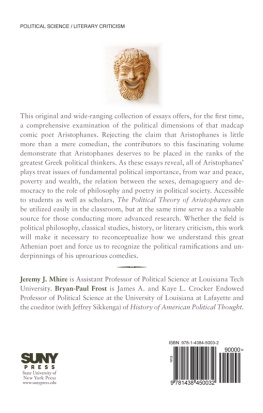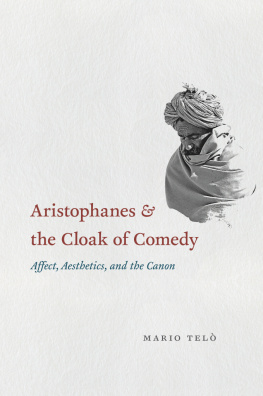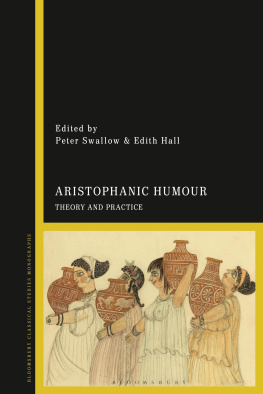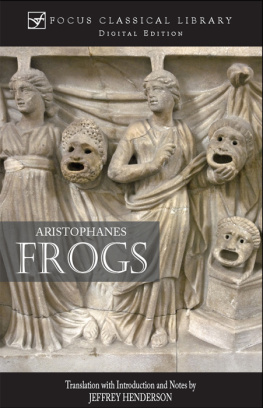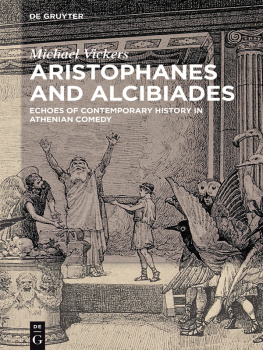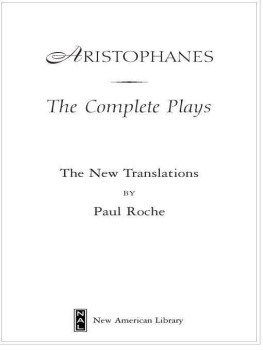The Political Theory of Aristophanes
The Political Theory of Aristophanes
Explorations in Poetic Wisdom
Edited by
Jeremy J. Mhire and Bryan-Paul Frost
Published by State University of New York Press, Albany
2014 State University of New York
All rights reserved
Printed in the United States of America
No part of this book may be used or reproduced in any manner whatsoever without written permission. No part of this book may be stored in a retrieval system or transmitted in any form or by any means including electronic, electrostatic, magnetic tape, mechanical, photocopying, recording, or otherwise without the prior permission in writing of the publisher.
For information, contact State University of New York Press, Albany, NY
www.sunypress.edu
Production by Eileen Nizer
Marketing by Anne Valentine
Library of Congress Cataloging-in-Publication Data
The political theory of Aristophanes : explorations in poetic wisdom / edited by Jeremy J. Mhire and Bryan-Paul Frost.
pages cm
Includes bibliographical references and index.
ISBN 978-1-4384-5003-2 (hardcover : alk. paper)
1. AristophanesCriticism and interpretation. I. Mhire, Jeremy J., 1977II. Frost, Bryan-Paul, 1961
PA3879.P58 2014
882'.01dc23
2013012778
10 9 8 7 6 5 4 3 2 1
Contents
Bryan-Paul Frost
Chapter 1
Seeing Democracy in the Clouds
John Lombardini
Chapter 2
The Meaning of Socrates Asceticism in Aristophanes Clouds
Khalil M. Habib
Chapter 3
Rethinking the Quarrel Anew: Politics and Boasting in Aristophanes Clouds
Jeremy J. Mhire
Chapter 4
Persuasion in Comedy and Comic Persuasion: Aristophanes and the Mysteries of Rhetoric
John Zumbrunnen
Chapter 5
Boundaries: The Comic Poet Confronts the Who of Political Action
Arlene W. Saxonhouse
Chapter 6
Aristophanes and the Polis
Stephanie Nelson
Chapter 7
On the Anabasis of Trygaeus: An Introduction to Aristophanes Peace
Wayne Ambler
Chapter 8
Aristophanes Herodotean Inquiry: The Meaning of Athenian Imperialism in the Birds
Kenneth DeLuca
Chapter 9
Learning the Lesson of Dionysus: Aristophanes Tragicomic Wisdom and Poetic Politics in the Frogs
Christopher Baldwin
Chapter 10
Wealth and the Theology of Charity
Paul W. Ludwig
Chapter 11
Anger in Thucydides and Aristophanes: The Case of Cleon
Timothy W. Burns
Chapter 12
The Comedy of the Just City: Aristophanes Assemblywomen and Platos Republic
Peter Nichols
Chapter 13
Peisetairos of Aristophanes Birds and the Erotic Tyrant of Republic IX
Matthew Meyer
Chapter 14
Aristophanes Feminine Comedies and Socratic Political Science
Amy L. Bonnette
Chapter 15
Leo Strausss UnSocratic Aristophanes?
Devin Stauffer
Introduction
Bryan-Paul Frost
The purpose of this edited volume is to make available to students, the learned public, and academics alike a series of chapters that documents and describes the political wisdom of Aristophanes. For those individuals who are unfamiliar with Aristophanesor who are uneasy with regarding this Athenian comic poet as a political thinker of the highest caliberthese chapters will hopefully make manifest his capacious range of vision, his trenchant insights, and his unique role as a civic educator; and for those who are more familiar with Aristophanesor who are quite comfortable with regarding him as a towering thinker both in his own right and with respect to his appreciation and criticism of other such political thinkers and figuresthen we hope that these chapters will reinforce and even deepen ones understanding of his philosophical thought, open up new avenues for scholarly investigation, and perhaps challenge in fruitful ways prevailing opinions and assumptions. All the chapters contained herein are original, and they were all written explicitly for this volume. The contributors include a wide assortment of individualsfrom junior- to senior-level scholars, political scientists to classicists, and those from inside and outside the academyand this diversity of background is often reflected in the various interpretive strategies and conclusions employed throughout. Although the editors themselves have assiduously avoided imposing any mandatory or uniform orthodoxy on the authors, all of the contributors are united in their belief that intertwined within Aristophanes madcap comedies lies a genuinely philosophical engagement with issues of the utmost seriousness, complexity, and fundamental importance: indeed, it is hard to name a single political theme of foundational significance that is not in some way discussed in his eleven extant plays. An examination of the About the Authors section will reveal that all of the contributors are well versed in ancient political thought, in general, and/or Aristophanes, in particular, and that taken together, they have written dissertations, monographs, translations, and books on these subjects, as well as published peer-reviewed articles in some of the most prestigious academic journals in their fields. Those who enjoy this volume will have no difficulty in following up and furthering this enjoyment by consulting other works by the various contributors.
By his own admission (and this on several occasions in the plays), Aristophanes considered himself one of theif not thegreatest comedians of all time, if not for all time. The historical record has only tended to confirm this (self-)assessment: Who does not fervently hope that someday, in the mustiest section on some neglected shelf of an unappreciated library, the remainder of Aristophanes corpus will be discovered (something that one would certainly not wish on every author, past or present!). Obviously, many scholars are interested in Aristophanes for what we might call antiquarian or historical reasons, namely, that his comedies reveal valuable information about his life and times and about the character of ancient artistic festivals. But however important this information is, Aristophanes continues to remain popular and to scintillate his audience because his comedies are remarkably topicaleven contemporaryregardless of the time period in which they are read or performed. It is difficult enough for an artist to get published in any age; it takes nothing short of a rare talent to be in print for some two thousand years. Although the reasons for his success could easily be the subject of one (or several) books, let us posit the following observation: the enjoyment of any particular piece of humor is exceptionally hard to sustain over the long term. Lets face it: there are many very funny individuals today (and in the past) whose humor and fame will (and did) last but a short time. If a comedians material is based primarily upon specific events and individuals in the immediate present, then the appeal of that humor will be limited to the here and now. Of course, someone knowledgeable about the circumstances of this kind of humor can explain why these jokes were considered funny in the pastbut we all know what happens to a joke when someone has to explain its humor to us. There is no doubt that Aristophanes comedies revolved around his own particular historical situation, and we must admit that although we are knowledgeable about some of these unique circumstances, much of what was humorous to a contemporary Athenian audience is more than likely simply lost to us today. But Aristophanes comedies do much more than poke fun at the here and now; they appeal to universal themes and topics that transcend, that is, are applicable to and comprehensible by, almost any particular political community. In other words, while his comedies may have plots and characters tied to contemporary Athens, the broad themes with which the plays deal are seemingly eternal in character and scope. For example, does a reader need to understand the Greek pantheon in order to recognize the poignant hilarity of Chremylus Delphic discovery that the god Wealth has been blinded by the apparently more powerful god Zeus, or Povertys arguments that Wealths sight should not be restored lest the human economic condition be made even worse? Or, again, is it necessary to read the Platonic and Xenophonic corpus to recognize in Aristophanes Socrates the typical and very modern intellectual, someone who is ensconced in an ivory tower or think-tank pondering all sorts of inane and utterly irrelevant matters of interest only to him and his disciples? Or, finally, does one need to know the ins and outs of the Peloponnesian War to understand the sex strike perpetrated by Lysistrata and her cohorts? Substitute almost any destructive conflict in human history and one can easily make sense of trying to bring an end to a male-dominated conflict through the withholding of certain feminine favors (and the equally uproarious difficulty many of the women have in keeping the strike and not crossing the picket line). Examples could be drawn from each and every play, but the idea is clear: Aristophanes comedies are not time bound because of their universality. Of course, our appreciation of Aristophanes only increases once we know more about the Greek pantheon, the Platonic and Xenophonic corpus, and the Peloponnesian War: indeed, the plays become even more amusing once we are immersed as fully as possible in the particular historical circumstances of ancient Athens and Greece. Nevertheless, because Aristophanes comedies are of the highest order, lack of knowledge of the latter does not impede enjoyment of the former, and enjoyment of the former is only made richer by knowledge of the latter.

